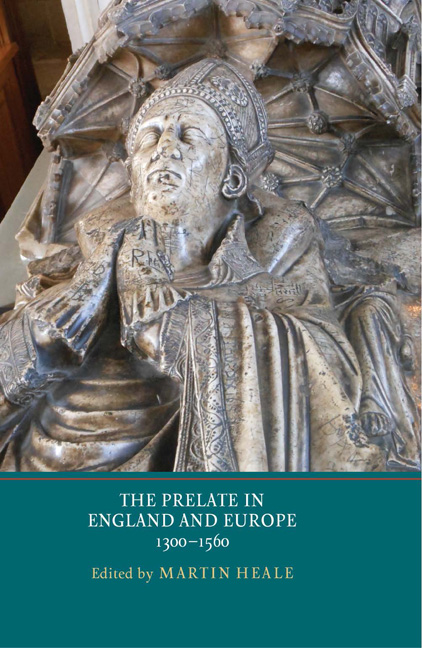Book contents
- Frontmatter
- CONTENTS
- List of Illustrations
- List of Contributors
- Preface and Acknowledgements
- List of Abbreviations
- Introduction
- Part I Prelates and Power
- Part II Patronage and Learning
- An Abbot and His Books in Late Medieval and Pre-Reformation England
- Prelates and the Provision of Books: Bishop John Carpenter's Carnary Library
- The Bishops and the Printers: Henry VII to Elizabeth
- Part III Identity and Display
- Part IV Attitudes towards Prelacy
- Index of People and Places
- Index of Subjects
- YORK MEDIEVAL PRESS: PUBLICATIONS
Prelates and the Provision of Books: Bishop John Carpenter's Carnary Library
from Part II - Patronage and Learning
Published online by Cambridge University Press: 05 November 2014
- Frontmatter
- CONTENTS
- List of Illustrations
- List of Contributors
- Preface and Acknowledgements
- List of Abbreviations
- Introduction
- Part I Prelates and Power
- Part II Patronage and Learning
- An Abbot and His Books in Late Medieval and Pre-Reformation England
- Prelates and the Provision of Books: Bishop John Carpenter's Carnary Library
- The Bishops and the Printers: Henry VII to Elizabeth
- Part III Identity and Display
- Part IV Attitudes towards Prelacy
- Index of People and Places
- Index of Subjects
- YORK MEDIEVAL PRESS: PUBLICATIONS
Summary
The most celebrated achievements of John Carpenter as bishop of Worcester (1443–76) are his educational initiatives, including his foundation of the Carnary Chapel Library at Worcester and of the Kalendars' Library associated with All Saints', Bristol. This essay will attempt to shed new light on Carpenter's activities in relation to the provision of books in his diocese, with a particular focus on the Worcester library. It will review and revise the current interpretation of the sources of evidence for the ordinances of the library, revising our assessment of what they can and cannot tell us; consider a recent suggestion concerning the holdings of the library; and propose new avenues for investigation of these foundations.
John Carpenter (c. 1402–76) became bishop of Worcester in 1443 and held the see until his death. He was an Oxford graduate and held various positions at Oriel College from 1417. He attracted royal patronage and Henry VI appointed him master of St Anthony's Hospital in London in 1433. This appointment finds him in relation with educated and prominent London clerics who were leaders in education and preaching. He was also associated with prominent citizens of London. Here his connections seem to have been the result of kinship with leading Londoners and in particular with another John Carpenter, Common Clerk of the city of London, who died in 1442.
- Type
- Chapter
- Information
- The Prelate in England and Europe, 1300–1560 , pp. 127 - 141Publisher: Boydell & BrewerPrint publication year: 2014



